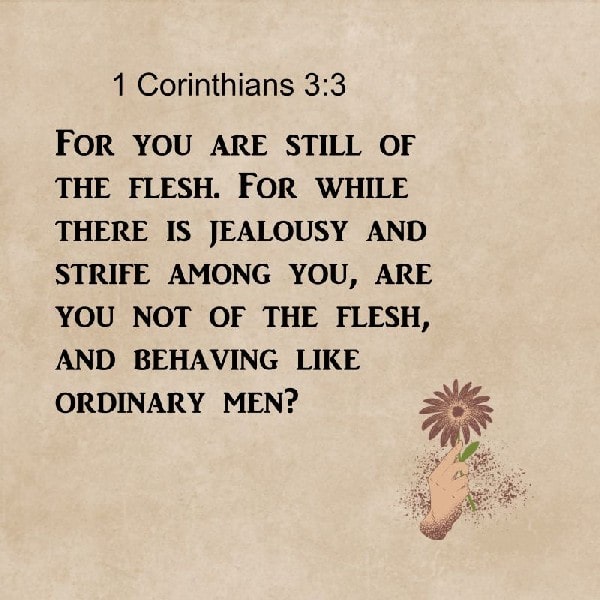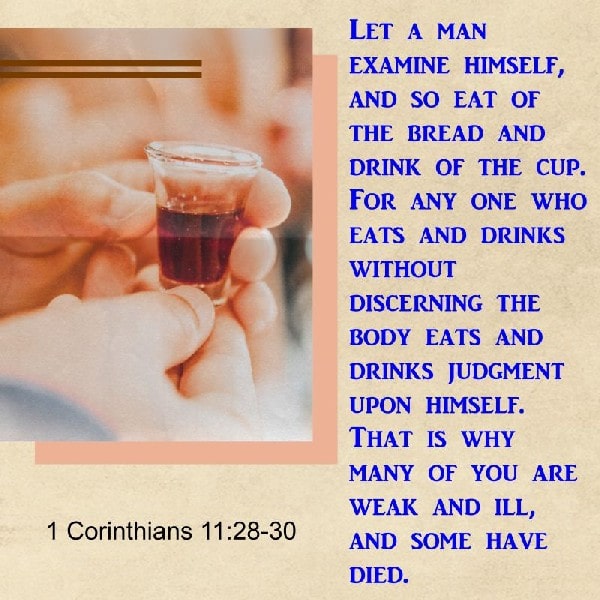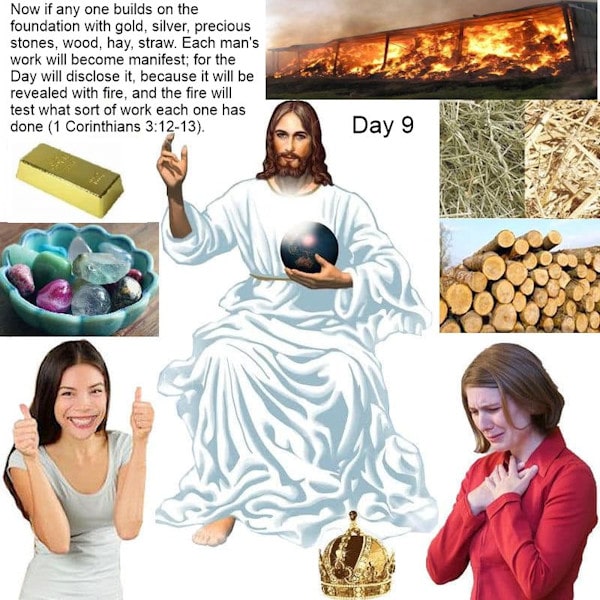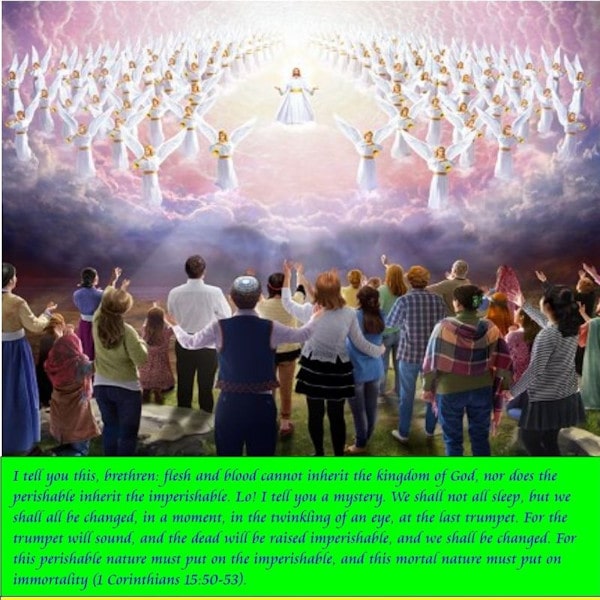1 Corinthians - Bible study of verses
1 Corinthians 1:2

We come to the letter to Corinthians.
In writing to the Corinthians, Paul reminded them that they were set apart, 'called Saints' (1:2); he commended those who were "enriched in all speech and knowledge" (1:5); the apostle commended them for their variety of gifts 1:7. But Paul also expressed serious concern for them. He pleaded with them to come to an agreement with each other (1:10); he was distressed by the divisions that had occurred among them (1:11). The apostle drew a detailed picture of the natural man's inability to understand spiritual concepts (1:18-26). He presented Christ as the supreme object of Christian loyalty and devotion (1:30-31). Paul made a detailed analysis of their spiritual state. And this was a sordid portrait. The list of accusations Paul leveled against the Corinthians ranged from carnal divisions to denial of Christ's resurrection. A lesser soul than Paul would have abandoned the church in despair or condemned it with indignation. Paul did none of these things - he preached Christ to them.
Let us go into studying this book.
1 Corinthians 1:10

Paul pleads with the Corinthians in strong, persuasive words: SAY ALL THE SAME THING. This is a classic expression used in relation to political communities that are free from tensions, or in relation to different nations that establish cordial diplomatic and commercial relationships.
The word for dissensions (schismata) means 'cleft', 'fissure', or 'division'. In the expression BE UNITED, Paul uses a medical term that is used in connection with the binding of bones that have been fractured, or the binding of a joint that has been dislocated. Paul wants them to come to right understanding and unity of opinion, or judgment.
Verse 1:11 - Paul had received a report from Chloe's family: It has been reported to me by Chloe's family that there are disputes among you. Cloe is not known except for the reference at this point. But it is observed that she was a woman of character and good position. Furthermore, the reference suggests that the church had elevated women to a position of dignity and respect.
The word Paul uses for strife means bitter arguments. The divisions at Corinth were not slight differences of opinion. They were deep-seated disputes that threatened the very existence of the church.
1 Corinthians 1:18

At first glance it seems that Paul is advocating rigid anti-intellectualism. But he was not putting a premium on ignorance. He had no intention "to base religious knowledge on nonsense, nor to reduce theological learning to a minimum". In fact, Paul was trying to show that true wisdom, the wisdom of God, is revealed in and through the Cross of Christ. Because "to know nothing but Christ, and Him crucified, is to know all that is meaningful."
To those who are still in the process of perishing today, the word of the Cross is madness. The word madness (moria) refers to that which is irrational, stupid, or worthless. On the other hand, for those who believe in it and accept it, the word of the Cross becomes the power (dynamis) of God. Because it is power, "the word of the Cross is, after all, the truest wisdom." Paul quotes a few verses to illustrate his claim that the wisdom of God is indeed a power operating in human affairs:
1- Isaiah 29:14 the wisdom of their wise men shall perish, and the discernment of their discerning men shall be hid.
2- Isaiah 33:18 Where is the wise man? Where is the scribe? Where is the inquirer of this century?
3- 1 Cor 1:20 Has not God made foolish the wisdom of this world?
He makes all the wisdom boasted of man look like folly:
1- Displaying its intrinsic insignificance and its corrupt results.
2. By the power of the Cross set in opposition to it, and triumphing over it.
1 Corinthians 1:27

To reinforce his claim that human wisdom stands in opposition to divine power, Paul asks the people to do a group analysis. As they did, they would find that most of them came from the lowest class of society, because not many wise after the flesh, not many mighty, not many noble are called. This is not to say that God does not call all men to repentance and redemption. Everyone is called, and occasionally, a person of high standing will respond.
So not many sages, or lovers of human wisdom and understanding, were believers; nor did the mighty, the chief and notable persons, accept Christ; nor did the nobles, or those of the upper classes or those born noble, submit to Christ, except in rare cases.
Paul emphasizes the lowest social position of most converts three times in verses 27 and 28 - THE FOOLISH THINGS OF THIS WORLD… THE WEAK THINGS OF THIS WORLD… THE LOW THINGS OF THIS WORLD. The FOOLISH THINGS refer to the uneducated men who baffled the greatest philosophers of Greece; LOW THINGS refer to those who had no secular power or authority; and THE DESPISED THINGS those who were considered vile and contemptible in the eyes of the Jews, who did not consider them better than dogs.
Therefore, the very nature of the converts indicated that NO FLESH could boast before him. Christians are to glory in Christ because in him they have experienced true wisdom, wealth, and power.
1 Corinthians 2:1

Do you sometimes hesitate to share the Gospel with others because you are not sure what to say? Even Paul, a great evangelist and teacher, did not count on a flowery speech or his ability to persuade people; he depended on the Holy Spirit to speak through him (see 1 Corinthians 2:1-5). Ask the Holy Spirit to speak through you too, and believe that He will. Just speak, tell your testimony, what Christ did in your life and what He can do in the life of the person who opens his heart to the Holy Spirit.
1 Corinthians 2:9

This passage is a message of hope and promise for Christians around the world. It asserts that God has blessings and rewards in store for those who love and obey Him. These blessings are so wonderful that they cannot be understood or imagined by human beings. They are reserved only for those who love God and trust His promises.
One of the greatest blessings God has in store for those who love him is his presence. The Bible teaches that God is always with us and will never leave or forsake us. Matthew 28:20: "Lo, I am with you always, to the close of the age." This is a blessing that surpasses human comprehension, but it is a reality for those who love God and trust in His word.
Furthermore, it is important to remember that the "things which eye has not seen, nor ear heard, nor have conveived the heart of man" do not just refer to material or earthly rewards. God can bless us in many ways, whether it be through meaningful relationships, emotional and spiritual health, or personal growth and maturity.
Finally, it is worth remembering that the promise of 1 Corinthians 2:9 extends not just to this life, but to eternity. When we accept Jesus as our Savior and follow His ways, we are guaranteed eternal life with God, where we can fully experience the wonders He has prepared for us.
1 Corinthians 2:14

In contrast to the spiritual man is the natural man. The natural man is he who "possesses … simply the purely human organ of perception, but who does not yet possess the organ of religious perception in … the spirit." The natural man has only the ordinary powers of man apart from God; as such, he does not understand the things of the Spirit of God... and cannot understand them, because they are spiritually discerned.
Since man's natural abilities are totally corrupted through sin, consequently every activity of his soul and mind will be darkened. Spiritual things are foolishness to the natural man, because such a man lives as if the whole of life were in physical things; he lives only for this world. His values are based on the material and the physical, and he judges all things in light of these terms. Such a man simply cannot understand spiritual things. One who thinks only in terms of sexual gratification cannot understand the meaning of chastity; a person dedicated to accumulating material goods cannot understand the meaning of generosity; a man motivated by a lust for power cannot know the meaning of sacrificial service; an individual whose life is guided by worldly attitudes cannot appreciate the inner spiritual impulses. Because the natural man does not open his life to the Holy Spirit, he regards all spiritual life and values as folly.
Our mind says what we think, not necessarily what God thinks.
Our will says what we want, not what God wants.
Our emotions say what we feel, not what God feels.
At the same time that the soul is purified, it is also TRAINED to conduct the THOUGHTS, WISHES and FEELINGS of God and thus TRANSFORM US into the Lord's SPEAKER.
The word of God teaches in 1 Cor. 2:16, which we have been given, the mind of Christ and the thoughts, feelings and purposes of his heart.
We have the mind of Christ, but the uncrucified soul "prevents" them from appearing.
The man wants to think his own thoughts, but God wants to use the man's mind to think His thoughts.
The Christian will have the mind of Christ, if he/she lets the Spirit reveal God's thoughts through the scriptures.
1 Corinthians 3:1

Paul could not speak to these people as Spirit-filled believers. Therefore, a distinction is made within the positions of the church. All believers receive the Holy Spirit when they believe and have faith (Eph. 1:13). Spiritual life is only possible in and through the Holy Spirit. But not all Christians are filled with the Holy Spirit and led by the Spirit. Some Christians are carnal. But while he labels the Corinthians as being carnal, Paul is quick to remind them that they are to be God's temples.
These Christians were BOYS; they "were still weak in grace, though eminent in gifts." Because you are children Paul says: WITH MILK I RAISED YOU AND NOT WITH SOLID FOOD. Milk and delicacy are nourishing foods. But normally milk is for the child with a delicacy and undeveloped body, while delicacy is for the strong and mature person who needs strength to do the hard work. Paulo was not willing to stay on as a nanny. He was a prophet. The Corinthians had not grown up. Instead of growing up in grace and humility, they were proud of their gifts and abilities; instead of expressing a strong spirit of unity. THEY WERE STILL CARNAL.
Beloved brothers, it is understandable that at the beginning of the Christian life some are carnal. But the Christian life is not static. Either the Christian develops to maturity through the ELIMINATION OF CARNAL TENDENCIES, or he parks himself in a state of deliberate boyhood.
1 Corinthians 3:3

Envy and division cause us to strive to obtain things that God will give us in His time, if it is His will that we come to possess them. A jealous and factious heart never sanctifies God. We should not envy what other people have.
The best way to overcome envy is to admit it. When you feel envy or jealousy, be honest with God and ask Him to help you live free of those feelings. Anything we hide has power over us, so bringing hidden things to light not only exposes them, but weakens their power over us.
Construct Life / Build a house on the Rock / Build upon Christ!
And they drank the same spiritual drink; for they drank from the SPIRITUAL ROCK that accompanied them, AND THAT ROCK WAS CHRIST. 2 Corinthians 10:4
WHO IS THE SPIRITUAL ROCK?
For who is God but the Lord? And who is Rock but our God? 2 Samuel 22:32
Our life is to be built on the solid foundation of Jesus!
He wants you to walk close to Him!
He wants you to grow in faith and knowledge on his part.
Put ALL your hopes and dreams in His hands and TRUST Him to meet all your needs.
Whatever the circumstances, the things of God are non-negotiable! DO NOT STOP PRAYING! DO NOT LOSE THE MOMENT AND MOVE OF THE HOLY SPIRIT IN YOUR LIFE AND FAMILY!
IT IS TIME TO MOVE FORWARD! TO GROW! TO LIVE, AND LIVE INTENSELY!
For no other foundation can any one lay than that which is laid, which is Jesus Christ. Now if any one builds on the foundation with gold, silver, precious stones, wood, hay, straw. Each man's work will become manifest; for the Day will disclose it, because it will be revealed with fire, and the fire will test what sort of work each one has done. If the work which any man has built on the foundation survives, he will receive a reward. If any man's work is burned up, he will suffer loss, though he himself will be saved, but only as through fire.
Do you not know that you are God's temple and that God's Spirit dwells in you? (1 Corinthians 3:11-16).
- The purpose of building on the foundation is to live to the honor and glory of God, not to receive the wages of gold, silver, and precious stones.
- The opposite is also true, when the believer does NOT build on the foundation of Jesus Christ then one may be saved as through fire, if one is not already left at the Rapture of the Church.
- Where this building with wood, hay or straw refers to, I still owe you the answer to, possibly just a Christian life of going to church and continuing to believe in Jesus Christ until the Rapture?
- Building with gold, silver and precious stones as a wage is a result of living under the guidance of the Holy Spirit and doing the Will of God. A building through evangelism or support, a daily prayer life and Bible reading, a relationship with God the Father.
- A life of testimony, the fruits of yesterday Day 8, are visible because the believer realizes that he or she is a temple of God in which the Holy Spirit resides. If one leaves the fruits and lives in the world, then unbelievers and believers cannot see that you are a temple of God. That is a dignified life, no piracy, faithfully paying your taxes, obeying to the traffic rules, dressing with dignity (especially when you go to church) you go to the House of God (the church).

1 Corinthians 4:4

Paul declared that it mattered little what the Corinthians thought of him. He was always compassionate, thoughtful and kind. But the apostle was almost wholly indifferent to men's reactions to him when it came to the matter of preaching the gospel. Such judgments had no bearing on his belief or conduct. The reason was simple: as a steward he was directly responsible to Christ.
Paul was also not dependent on his own judgment. He did not omit self-criticism and was painfully aware of his shortcomings. However, he said: NEITHER DO I JUDGE MYSELF. Self-judgment is dangerous because a person too easily sanctions his own opinions, approves of his own conduct, or argues in favor of his own mistakes. The sentence: BECAUSE IN NOTHING I FEEL GUILTY syndicate that Paulo knew very well a non-accusing conscience does not necessarily indicate the exemption of some guilt.
Furthermore, if Jesus is the final judge, the Corinthians must not judge anything before the time, until the Lord comes, who also will bring to light the hidden things of darkness and make manifest the thoughts of the heart. In the final judgment, EVERY ONE WILL RECEIVE PRAISE FROM GOD. Thus people must be careful neither to reap premature praise of favorite preachers nor to pour out scorn on persons not to their particular liking. God is the only one who is qualified to judge.
1 Corinthians 4:12b-13a

In this world, there are wonderful people that God has specially called to be His servants. They are men and women who announce the word of God, advise and care for their fellow men.
The apostles were practically the first to exercise this role after the coming of Christ. The apostles faced a lot of suffering, physical punishment, imprisonment, risk of death, in addition to public humiliation and contempt. However, when the apostle Paul wrote the text of 1 Corinthians 4, he was not referring to sufferings caused to him by non-Christians, but he was writing to the Corinthian church.
Nobody likes to suffer! The apostle did not like it either. However, he was aware that suffering was part of his mission. He wanted everyone to come to faith in the Lord Jesus, and so he acted with love even when he was humiliated or hurt.
Even today there are many servants of God who are ridiculed but respond with soft words. There are many who are cursed by those who do not want to receive correction from the Lord.
True servants of God deserve our respect and honor. They are people who leave everything behind because they are sure that Christ can save those who are unhappy and lost. May we know how to respect and honor them! And, with the same certainty of salvation in Christ, may we also have the necessary courage to witness our faith, even in the most difficult times!
1 Corinthians 4:15

Paul had a father's heart for the believers in the Corinthian church.
Having a father's heart is having that kind of tender, caring, dedicated attitude that trains, teaches, and does not give up on people just because they do not learn quickly.
A father takes pleasure in teaching his children to walk or play ball. He does not get mad that they do not master the steps the first time, but he keeps working with them until they learn how to do it. A good father does not give up on his children, but commits to them for life.
Paul said the church is full of tutors and teachers, full of people who can preach a sermon and tell others what to do. But he also said there are not enough fathers in the church.
If you want to be a leader in the body of Christ, especially if you want to be a pastor, you need to have the heart of a father.
Maybe you feel unqualified to be someone's 'parent' in the spiritual life. Maybe you did not have a father who was a good role model for you. Maybe he does not know how to act like a parent. The truth is, we all had imperfect parents here on earth. You need to understand that God is a good heavenly father. He can care for you like your loving Father and show you how to treat others in the same way.
Paul promises to visit the Corinthian church and when he does he will test the claims of these convinced leaders, not their words, but their power, their virtue. He had gone with a demonstration of the Spirit's power (1 Corinthians 2:4). Signs, wonders and changed lives confirm his ministry. He would find out whether their ministry was just pompous and empty words, or backed up with power. This is important, for the Kingdom of God is more than mere words - it is power.
Paul was not speaking either about the future dispensation of the Kingdom or about the Church. The 'Kingdom of God' he was referring to was God's rule and authority, the way in which God shows in the present that He is actively reigning on the throne. Paul had a similar thought in Romans 14:17, where he declares that the Kingdom of God - which shows that God is reigning in our lives - is not a matter of rules we follow about eating and drinking, but of "righteousness, peace and joy in the Holy Spirit". When we manifest these things we show that God truly is our King.
The Spirit also shows His power when He convicts the world "of sin and righteousness and judgment" (John 16:8). He continues the work that Jesus God gave to Paul to "to open their eyes, that they may turn from darkness to light and from the power of Satan to God, that they may receive forgiveness of sins and a place among those who are sanctified by faith in me (Jesus)" Acts 26:18.
1 Corinthians 4:20

- Recognize that Kingdom ministry involves signs, wonders, and miracles that demonstrate the power of God.
- Never give up! Stay steadfast in faith. Abundant in service to God. Know that nothing that is done in Jesus' name is in vain.
- Therefore, my beloved brethren, be steadfast, immovable, always abounding in the work of the Lord, knowing that in the Lord your labor is not in vain 1 Corinthians 15:58.
1 Corinthians 5:6

The spiritual law declared by Paul here has both a negative and a positive aspect. The negative element is found in the expression: IT IS NOT GOOD TO BE PROUD. The word does not denote a display of vainglory. Rather, it points to the attitude of pride and vanity. The abundance of knowledge and gifts should have produced a higher type of spiritual life in the church. But it had the opposite effect. People were smug about self-assumed spiritual superiority, yet blind to an overtly shameful act.
The positive aspect of the spiritual law stated here is sensible indeed: Do you not know that a little leaven makes the whole lump leaven? Being indifferent to the presence of sin does three things for a congregation. It shares part of the responsibility and blame; lowers standards of Biblical faith and conduct; and encourages a gradual spread of other sins in the congregation.
The problem with the Corinthian church was that it was either unaware of or indifferent to the seriousness of spiritual decline. The leaven not only was the presence of an unpunished offender in their fellowship, "but the general complacency and impurity shown by their complete tolerance of the matter." If such a poisonous sin were allowed to remain, "it would bring with it an indefinite corrupting power; it would defile the whole community." Since one bad member can contaminate the whole church, there was a danger of future contagion. A spiritually proud church can gradually become infected with sin until the whole church is guilty of overindulgence in, or actual participation in, sin.
1 Corinthians 5:12-13

Paul was not commissioned to JUDGE THOSE WHO ARE OUTSIDERS. An OUTSIDER the Jews called Gentiles. Paul borrows the term and uses it to include both Gentiles and Jews - all those who have not accepted Christ. Regarding sinners, Paul had only one obligation - to preach the gospel. He was aware that his influence on apostolic discipline extended only to those who professed a common faith in Christ. The duty of both Paul and the Corinthians was to exercise discipline toward those within the church.
God deals with sinners, those who are not yet born again: but God judges those who are without. Of course, the unfaithful Christian is also judged by God. But the Christian has an obligation to exercise valid discrimination regarding conduct within the fellowship of believers. So Paul's verdict still stands: PUT THEREFORE OUT OF YOURSELVES THAT WICKED ONE. The church must express concern about the actions of its members.
A DISCIPLINED CHURCH
1. Does not approve of immoral conduct
2. It is a purified church
3. Reflects sincerity and truth
4. Recognizes that there must be a differentiated treatment for sinners who are in the church, and for those who are outside of it.
1 Corinthians 6:1

Paul deals with another situation that was not helping them in their Christian witness. The Corinthian believers, like most of us today, did not always agree with each other. Thus, they were taking their disagreements to the civil court, before pagan judges instead of taking them before 'the Saints' (that is, believers who are sanctified by the Spirit). These judges would arbitrate according to pagan laws and ideas, rather than according to Christian principles. Paul does not mean that we cannot use civil or criminal courts for serious situations involving unbelievers. He did not even mean that pagan judges never gave a just verdict or decision. But affairs between believers would be observed by the pagan world, which would then question Christian love for the Corinthian believers. This prospect horrified Paul.
Paul wanted the Corinthian church to seek out its wise members to arbitrate the differences between them. One day, Christian believers will take part in governing the world (see Mt 19:28; 2 Tim 2:12; Rev 22:5). In comparison to this great responsibility, the issues that the believers were bringing before the pagan judges were trivial. Surely, believers should already be competent to judge such cases.
Verse 7 - Indeed, it is truly a fault among you that you have demands against one another. Why do not you suffer injustice first? Why do not you suffer the damage first? But you yourselves do injustice and do harm to your brothers.
CHRISTIANS WHO HAVE LAWSUITS AGAINST EACH OTHER ARE ALREADY LOSERS. Both sides are already completely defeated before God and in the eyes of the community. Unfortunately, there are legal matters that can only be dealt with by an earthly court.
1 Corinthians 6:12

Because they were free from the law, they assumed they could do whatever they wanted. Like some today, they may have said, "IF YOU FEEL GOOD, DO IT." But Paul responded that "not all things are beneficial" (they are beneficial, useful, truly good, and advantageous to the body of Christ). Furthermore, many things, even legitimate things, can enslave us. Paul refused to be dominated by anything. He was subject to the authority of God and Jesus Christ. And he would not let things or human desire dominate him, not even things that in themselves were not sin.
Self-discipline is actually the greatest freedom of all. In self-discipline the Spirit directs, and Christian lives are free from tyranny - whether from sinful acts or from domination over things that in themselves are not wrong. Freedom becomes a snare when it weakens character, saps spiritual vitality, or reduces the effectiveness of Christian witness.
1 Corinthians 6:18-19

To understand what Paul is saying or why he is making this statement we need to go back a little. In verse 13 of the same chapter Paul's opponents said that "delicacies are for the belly and the belly for delicacies", implying that it was okay to satisfy physical desires in whatever way pleased them. According to Paul's response, God will destroy "both the one and the other": the belly that a person is tempted to satisfy and the delicacies that satisfy the desire.
But what they had in mind was more than food as shown by Paul's next statement. In effect, they were declaring that the body was made for sex and sex for the body, in this way sexual desires could be satisfied by any type of immorality without feeling greater guilt than putting food in the stomach.
It was easy for the Corinthians to assume this attitude, because with their Greek background, they had a negative view of the body, considering it of little importance. Many philosophers considered the body to be the prison of the soul, which is why they thought that things that were done in the body did not affect the soul. But God created the human body. He created Adam and Eve for each other and for himself. The body was made for the Lord to be a means by which we can express ourselves in worship and service to Him. Paul's desire was that Christ will, both now and ever, be magnified in my body, whether by life or by death (Phil 1:20).
The Lord is for the body not only because He created it, but because He knows that we need a body for the full expression of our nature as His children. He demonstrated this point by raising our Lord Jesus from the dead by His power. Jesus identified with humanity from birth to death in order to take our place and die for us on the cross. But God did not just raise Him spiritually, He raised Him with a real, tangible body. He had been transformed, it was a different order, but He could still walk, talk and eat with the disciples (Luke 24:37-43; Acts 1:3,4,6). Therefore, because the body is so important to God and to us, we should never let sinful desires lead us to immorality of any kind.
1 Corinthians 7:9

The verb to contain oneself (egkratevomai) means to possess within oneself the power to control oneself. If people lack this power, they should get married. It is permissible for people who lack the power of control in the matter of sex to get married, and thus solve the problem related to sexual impulses. It must be said again that Paul is answering a question about a specific situation in Corinth , and not presenting a universal principle for all Christians. Encouraging Christians to marry solely for the purposes of sex would be absurd, but it is one of the factors to consider. It is better to get married than to continually struggle with the fire of sexual desire or, even worse, suffer the guilt of giving in to such desire outside of the marriage relationship. In a very real sense, to smolder means "to be consumed by passions that would completely dominate if there were no continence." If you find yourself in this situation, pray, ask God for a husband/wife... be patient, I know waiting is painful, even more so when we see our friends getting married, becoming parents... and it is not our turn!!! But waiting patiently is the best and safest thing... I myself waited so long, but God did not forget me, it was years of waiting... but one day... when God did it... it was so quick... overnight I was getting married... and it has been 17 years. Believe! God is most interested in promoting your happiness in this area.
1 Corinthians 7:10-11

Divorce was a free and easy matter in Corinth, as in all cities under Roman rule. The Roman legal system gave both parties the right to take the initiative to dissolve the marriage. Jewish law also permitted a man to give his wife a bill of divorce for insignificant reasons.
When dealing with marriages between Christians, Paul can speak with authority: HOWEVER, I ORDINATE THE MARRIED, NOT I, BUT THE LORD. In essence, it conveys a commandment given by the Lord Jesus Christ. Paul seems to have in mind Jesus' words in Matthew 5:32; 19:9; Mark 10:11; and Luke 16:18. These commandments of Jesus, repeated by Paul, simply state that Christians should remain loyal to their marriage vows, and remain together as husband and wife.
As said in a meme on the internet by a man from the countryside who says that he is now a believer but that it is very difficult, without doing many things yourself, but you still run the risk for one reason or another of going to hell. It is funny the way he talks ... but it has a kernel of truth... when a marriage goes through certain crises, there is no understanding, disagreement is inevitable ... look ... not everyone has that love for Christ to resist, and give up their will … and trying to negotiate … it gets difficult … and there is a strong desire to say: "It does not work, it is better for everyone to go their own way" … and many people act like that … many times the pastor will give advice and people are worried so much anger, such a hard heart that there is no arguing. But you have to seek God... if you are sincere with the Lord, is it difficult for God not to act... do not argue with others! Seek God, cry out to the Lord, pour out your heart... There are countless testimonies where, humanly, that marriage was no longer viable. But through the cry of one of the spouses the Lord did… God re-united.
1 Corinthians 7:29

The word TIME (kairos) indicates a time or period that provides an opportunity. Here she refers to the return of Christ.
Because the time to work for Christ is short, all believers must become detached from the things of the earth, which are about to come to an end. Although it is impossible to completely escape domestic and other duties, such activities must be viewed in light of the coming of Christ. Therefore, marriage, sorrow, joy, and business transactions must all be placed in an eschatological setting. The believer can USE the things of THIS WORLD, but he must never allow secular matters to interfere with his spiritual life. The apostle declares that the appearance of this world is passing away - that the order of things was changing. The night passes and reaches its end; the day will soon dawn. Therefore let us abandon the works of darkness, and put on the armor of light (Romans 13:12).
1 Corinthians 8:1-3

Anyone who insists on acting exclusively based on the thought that everything is, in theory, permissible, has not yet learned the basic principle of Christian freedom.
In the Christian life, love, not wisdom, is the safest guide. The Christian needs to have wisdom, but there is always a certain degree of danger in it. Wisdom "tends to make a man arrogant, to feel superior and to despise those who are not as advanced as he is."
Wisdom develops personal pride, while love develops the church.
Paul's purpose was to "condemn that vain concept of wisdom, or self-confidence, which leads us to despise others or ignore their interests." The "presumption of omniscience is detestable in anyone." In the Christian, this presumption is contrary to humility and love, and is also harmful to the area of personal influence.
BEING KNOWN BY GOD - Means someone who is approved by God, is loved by Him, has favor with Him. God knows a person through love, through personal intimacy… Love, not knowledge, must determine Christian conduct.
GOD'S DIVINITY AND ATTRIBUTES
- The Holy Bible presents one God in three persons: Father, Son and Holy Spirit. The Father is over all, the Son for all people and the Holy Spirit in all the saved ones.
- So there is a God the Father, a God the Son and a God the Holy Spirit.
- The Father God is a fullness of the invisible divinity; the Son God, a fullness of the divinity manifest and visible; the Holy Spirit is a divinity that generates life, the revelation of the power of God.
- God is a Trinity, but they are not three gods, but one God in three persons, and forms a triunity (Gen. 1,26 - Deut 6: 4 - Mt 3: 16,17 - Mt 28:19 - John 14: 16 - 13:13 - Hebrews 9:14)
- We believers believe we are baptized in the Spirit, forming one body ... EVERYONE needs to be full of the Spirit!
1 Corinthians 9:22

The term 'weak' is indicating Christians who had recently converted, who were very sensitive, who did not have a strong conviction, or who had poor understanding. Paul's approach did not involve a sacrifice of principle, but a willingness to approach men from their most accessible side. No practice seemed too tiring to him, no demand was too stupid, no prejudice was too absurd; he eternally took care of each matter with the aim of saving souls. The same author added this significant comment: Free with respect to everything, he became a slave to everyone, out of love. The salvation of souls was more important than personal freedom.
Paul wanted to be efficient in preaching the gospel. And he wanted to have the ultimate experience of living the Christian life on a higher level.
1 Corinthians 9:24

The Athlete Example: Paul was motivated by the desire to win others to Christ. However, he understood that personal and private experience cannot be separated from public expression and declaration. Therefore, the apostle presents the example of discipline and self-sacrifice that include both public efficiency and private spiritual development.
First of all, the winner needed to dedicate himself to the maximum: RUN IN SUCH A WAY THAT YOU CAN WIN. Afterwards, the winner needed to accept the rigor of the training - EVERYONE WHO FIGHTS, MUST DENY HIMSELF OF EVERYTHING (v25). For a Greek athlete, this period of intense training lasted 10 months, and during this period, competitors lived a life of constant exercise and rigorous discipline, and abstained from anything that could weaken or gain weight. Paul showed that these athletes received as a reward only a CORRUPTIBLE CROWN - a crown made of pine leaves, laurel, or parsley, which soon withered. The Christian, on the other hand, was fighting for an INCORRUPTIBLE crown.
A great characteristic of the winner was the certainty of direction. The Christian does not run like an uncertain thing, nor like HITTING THE AIR.
WINNING IS BEATING YOURSELF - a final characteristic of the winner was consistent personal dexterity. The apostle writes: I SUBJECT MY BODY AND REDUCE SERVIVITY. The biggest obstacle to winning the race is the person himself. Paul does not say the flesh but the whole organism; the whole person must be brought under control. Paul was not only the messenger who called on others to be effective, but he himself was a competitor. He knew very well how tragic it would be to be the one who instructs others on the rules to be observed in order to win the prize, while having himself been rejected for having transgressed them.
1 Corinthians 10:1 and 5

The story in the Old Testament does not exist just to satisfy our curiosity about ancient times. The Holy Spirit inspired such a record because there would be lessons for future generations, including the Corinthians and us.
This illustration emphasizes the fact that God's people, redeemed and filled with the Holy Spirit, can lose, not win the prize and be rejected. God did not approve of most of the children of Israel.
Despite the miraculous provision for His people, it finally forced God to punish them. Because they were rebellious and complacent, GOD WAS NOT PLEASED. Most of them made mistakes. Only Joshua and Caleb entered the land of Canaan (Nm 14:30-32). All the others failed to receive the prize, so they remained prostrate in the desert. The verb PROSTRATOS literally means "spread out, scattered or dispersed". The desert was covered in corpses. These disobedient people had died because of God's displeasure. The pictorial image of the desert covered with corpses was intended to shock these groups of smug and self-satisfied Christians in Corinth.
1 Corinthians 10:6-10

1 Corinthians 10:6-10 - The people of Israel became an example to warn us and prevent us from committing the sins they committed. God knows we need warnings.
These depraved and evil things they did included idolatry, in which the people behaved despicably at pagan festivals (which included sexual orgies, along with singing and dancing) before the golden calf that Aaron made (Ex 32:6,18,19). Moses ordered the Levites to execute the leaders with the sword, and three thousand people were killed. Then, God sent a plague (Ex 32:25) which raised the total to 23 thousand dead.
Those who died by the fiery serpents were the people who had spoken against God and against Moses (Num 21:5), which was a sin, for putting God to the test (Ex 17:2). The book of numbers presents eight instances in which the people murmured or complained. Paul probably had in mind Numbers 14:1-38 and Numbers 16:41, where murmuring brought divine judgment, which Paul understood was carried out by the same destroying angel who brought the plague of the firstborn in Egypt.
Today, many worship false gods. Idolatry that replaces the one true God with anything else leads today to corruption, immorality and pagan pleasures, just as it did in Biblical times. New Age doctrines and progressivism undermine Biblical values. GOD DESPITE BEING PATIENT HE WILL NOT TOLERATE SIN ANY MORE THAN HE TOLERATED IN THE PAST.
1 Corinthians 10:12-13

GOD IS FAITHFUL, AND HE WILL NOT ALLOW TEMPTATIONS GREATER THAN YOU CAN WITHSTAND. WHEN YOU ARE TEMPTED HE WILL SHOW A WAY OUT SO THAT YOU CAN RESIST. Paul not only warns us, he also encourages us. We are not doomed to fall. We will have temptations, tests and trials. It has been part of the human condition since Adam and Eve fell. But we do not need to fall. We have a God who is faithful. He will not abandon us, nor let us be tempted beyond our endurance, beyond what we can bear.
With every temptation our faithful God will provide an escape - a successful outcome so that we can endure it. In other words, because we are certain that the Lord is with us and will help us overcome, we can endure it instead of giving in. We also have to remember that temptation should never be confused with sin. If temptation were a sin, God would not provide help to bear it.
We have the added assurance that Jesus knows how we feel. In Gethsemane, His burden was almost unbearable, but God sent an angel who comforted Him (Luke 22:41-43). How encouraging this fact is to us when we are confronted with the impossibilities of life. We can certainly count on God to send His angels to serve on behalf of those who will inherit salvation (Heb. 1:14).
1 Corinthians 10:21-22

Paul felt that some were saying that they were not afraid to participate in pagan feasts. They believed they were spiritually strong enough to do it and not let it affect their relationship with the Lord. Paul, in effect, asks them what they think they are doing and who they think they are? The Old Testament reminds Israel time and time again that God is a jealous God. In other words, He wants all your love, all your devotion, all your adoration, because only He is God and only He can bless you and help you. By going to the idolatrous banquets, the Corinthians were acting as if they wanted to incite God's jealousy. If they think they are strong, they will find that they are not as strong as God. Judgment is implicit.
Paul's lesson here certainly has an application to Christians who think they can participate in modern idolatry - the astrology, the occult, the drug culture and much more that we see some practicing and every step they take in that direction they are more encouraged. Without this affecting your relationship with God. God's judgment will come upon them sooner or later. All of these things, including the miracles or supernatural events they produce, speak with the voice "of Satan and his demons."
1 Corinthians 10:29

Paul's answer to this question is as follows:
FREEDOM TO THE GLORY OF GOD - (10:31 - 11:1). In activities that are not specifically good or bad, but left to the discretion of the Christian's conscience, the main question should be: "HOW CAN IT BRING GLORY TO THE CAUSE OF GOD?" Therefore, whether you eat or drink or do anything else, do everything for the glory of God. Paul wanted to eliminate all possible obstacles to an effective ministry. He specifically mentioned three classes of people whom he was anxious to help. The apostle avoided being an antagonist toward the Jews, who were religious but not converted. He gave gentle, careful thought to the Gentiles who were heathen and unconverted. But Paul was especially concerned about the members of God's church.
Paul was a leader in the experience of freedom in Christ. But he was also a dedicated servant and self-disciplined in his approach to personal conduct. He refused to do anything that would be a stumbling block to men outside the church, or alienate those who had already been saved. For this reason he said: BUT WHATEVER GAIN I HAD< I COUNTED AS LOSS FOR THE SAKE OF CHRIST, BUT THE PROFIT OF MANY, THAT THEY MAY BE SAVED. Christ came as a servant. He was Sovereign of the universe, yet He accepted the role of a slave. The lesson is quite clear. It is not the exercise of personal freedom that attracts men, but rather the Christian's submission to God, and the "exercise of freedom to serve others."
Disciples or imitators of Jesus
Paul calls in 1 Corinthians 11: 1 to follow him, as he follows Jesus Christ. In fact, it is the command of Jesus in Matthew 28:19: Go therefore and make disciples of all nations, baptizing them in the name of the Father and of the Son and of the Holy Spirit, 20 teaching them to observe all that I have commanded you. - Jesus' order is to preach the gospel to all nations on earth. - After the person has remorse and repented of sin and repented of his or her worldly way of life, to be baptized in the name of God the Father, the Son Jesus Christ, and the Holy Spirit. - To teach the education as proclaimed by Jesus, the Old Testament with examples from daily life as described in the 4 Gospels. - In addition for us comes the teaching in the New Testament, the teaching of the apostle Paul received from the hand of the risen Christ, the letters of the apostles and the revelation of God what will happen to believers and unbelievers in the future, in the book of Revelation. - The entire Bible has to be taught to man and it is up to man to learn. It is up to the believers to bring this teaching into practice and to be followers of the Lord Jesus Christ in word and ACT.
1 Corinthians 11:1

The first verse of chapter 11 belongs to the sum of the end of chapter 10. Paul wants believers to exercise their will to become his imitators in proportion as he is an imitator of Christ. He does not mean that he is the perfect example, but Christ. His innocence; your love and compassion; his humility, meekness, patience and mercy; his concern for women and children, the sick and poor; His obedience to the Father's will by sacrificing Himself for our salvation - all makes Him the perfect example. More than that, He is the "He reflects the glory of God and bears the very stamp of his nature" (Hebrew 1:3). He is more than our example, of course, because he is the Savior and Lord. We have to remember that we cannot follow Him or even imitate Paul's view of Jesus until He is our personal Lord and Savior.
1 Corinthians 11:26

FOR I RECEIVED FROM THE LORD WHAT I ALSO DELIVERED TO YOU: THAT THE LORD JESUS ON THE NIGHT WHEN HE WAS BETRAYED, TOOK BREAD, AND WHEN HE HAD GIVEN THANKS, HE BROKE IT, AND SAID: THIS IS MY BODY WHICH IS FOR YOU. DO THIS IN REMEMBRANCE OF ME (verse 23). Paul reminds them of what Jesus told him in person, possibly during the three years the apostle spent in Arabia (Gal 1:11,12,15-17). Mentioning the "night Jesus was betrayed" it reminds us that Judas was present. Paul wants the Corinthian believers to remember that one of Jesus' own disciples betrayed Him, something we also need to remember. But Judas' presence did not diminish the love that filled Jesus' heart.
DO THIS - is in the present continuous tense: "keep doing this" (until Jesus comes again. Doing this "in memory" of Christ also addresses the Corinthians' apparent inability to remember anything other than their appetite when supposedly gathered to participate in the Lord's Supper.
The term translated as "memory" (Greek anamnesis) may not mean what you think. Considering that today to remember something is to remember a past occasion, the New Testament understanding of the word anamnesis is just the opposite. Such remembrance meant "carrying forward an action that is buried in the past in such a way that its original potency and vitality are not lost but brought into the present." So every time we celebrate the Lord's Supper we must "remember" to claim again the benefits of His death and resurrection..
1 Corinthians 11:27

The Lord's Supper represented the inauguration of a new covenant of grace, and was to be observed as a memorial. Both the broken body and the shed blood should be considered as symbols and not as literal references to the body of Christ. Any idea about a miraculous transformation of either bread or wine is contrary to the Biblical account. Finally, the Lord's Supper should be celebrated as a memorial or remembrance, and not as a means of salvation. DO THIS IN MEMORY OF ME and ANNOUNCE THE DEATH OF THE LORD UNTIL HE COMES confirm this.
Eat or drink the cup of the Lord unworthily - the adverb UNWORTHILY refers to the difference in weights; therefore it means "different weights" or "improperly balanced". A person's attitude may not be balanced with the importance of the occasion. If one participates in the Lord's Supper frivolously and carelessly, without respect or gratitude, or even if one is in sin or expressing bitterness toward another fellow believer, he or she will be participating unworthily.
To participate unworthily is to be guilty of the body and blood of the Lord. The word GUILTY (enochos) means being subject to the criminal effect of an act; here the word … (involves) guilt over the death of Christ. Instead of presenting himself to the table with an improper or sinful attitude, the believer must appear "in faith, and with due behavior in relation to everything that is appropriate to this Solemn ritual".
1 Corinthians 11:28-30

Before participating in this sacred service, ONE EXAMINE ONESELF through rigorous analysis. This word means to test; therefore, the believer must examine his motives and his actions. Certainly no one can earn, as payment, God's grace and forgiveness. But, on the other hand, a sincere examination will indicate whether the person attended the sacred table out of sincere motives and active obedience to the Lord. Paul's teaching is completely positive. He does not say that anyone should do self-examination and leave the Lord's table in a desperate situation. On the contrary, he advises man to examine his heart and then, filled with sincere faith, EAT OF THIS BREAD, DRINK OF THIS CUP.
THE DANGERS OF IRREVERENCE - The ARA version translates verse 29 as follows: "He who eats and drinks without discerning his body eats and drinks judgment upon himself." The word krima, which this version translates as judgment, means CONDEMNATION. Paul does not intend to affirm that the person who comes to the table without the appropriate spiritual qualifications will be eternally cursed. He means that such an act will bring condemnation and guilt. NOT DISCERNING THE BODY OF THE LORD means that the Christian was not able to distinguish between the sacred memorial of the Lord's Supper and other types of meal.
THE RESULT OF THE ABUSE OF THE LORD'S SUPPER - There are many among you who are weak and sick, and many who sleep. Paul warns that punishment could occur, bringing illness and even physical death. WEAK AND SICK = Sickness and decay! And others who sleep have already died physically. Here is a prejudgment inflicted by God. And Paul is trying to awaken us to salvation.
1 Corinthians 11:31

But when we are judged by the Lord, we are chastened so that we may not be condemned along with the world (verse 32).
The way to avoid God's punishment is to judge ourselves voluntarily and sincerely. But, when God sends His judgment to the believer, he is REBUKE BY THE LORD. In these cases, God's punishments are not severe, but symbols of His love. They are sent to deliver us from the ways of sin and so that we will not participate in the condemnation of the world.
The final determination of verse 34 is again a warning not to consider the Lord's Supper an ordinary meal. The purpose of the Supper is to remind believers of Christ's redemptive work and to awaken in the church a spirit of unity and love.
1 Corinthians 12:4-6

Did you know that the Holy Spirit gives you spiritual gifts (1 Corinthians 12:4-11)? Every believer - including you - receives at least one spiritual gift, and often more than one. If you do not know what your spiritual gifts are, pray for the Holy Spirit to reveal them. Ask your church about how you can participate in a spiritual gifts class or find out about a spiritual gifts test you can take. These tests often help people understand themselves and give them the freedom to start working on using their gifts. Thank the Holy Spirit for giving you the gifts He chose, and ask for wisdom from above to use them.
1 Corinthians 12:11

Paul gives three lists of gifts in this chapter (12:8-10;28-30). Each gift he mentions seems like something that can be manifested in a variety of ways according to the will of the Holy Spirit. Some assume that the first list is complete and inclusive. But Paul does not say, "These are the gifts of the Spirit. He simply presents the list, saying: here is one gift given by the Spirit, here is another gift given by the same Spirit." He is emphasizing that all gifts come from the Holy Spirit. He is an infinite person and we can be absolutely certain that He has an infinite supply to meet every need.
The Holy Spirit gives manifestations (revelations, means by which the Holy Spirit makes Himself known openly to each believer) but not for the individual's own benefit or for any blessing that the person can claim for himself. Nor does Paul mean that every believer has a gift or is "gifted." The point is that every gift that the Holy Spirit distributes is given through individuals "for whatever is useful, for the common good, for the good of the local body as a whole".
1 Corinthians 12:27

Have you ever thought that your spiritual gifts were not as important as someone else's? It would be the same as saying that your eyes are not as important as your ears. The truth is that every gift is necessary for the body of Christ to function as God intends (read 1 Corinthians 12:20-25). Recognize and celebrate the importance of each person's gifts, including yours. However, be careful not to think that your gifts are superior to others.
1 Corinthians 12:31

At this point, it appears that Paul is contradicting himself. In verse 11 the apostle had stated that the Spirit works in the church, "apportioning to each person as he pleases". Again in verse 28 he declared that "God hath put some in the church"… These two statements indicate that the gifts are sovereignly given according to the will of God. However, Paul tells the Corinthians: SEEK WITH ZEAL THE BEST GIFTS. Here are reflected the truths of God's sovereignty and man's free will.
The expression SEARCH WITH ZEAL means to be "burning with zeal, to be zealous." The exhortation to seek the best gifts indicates a difference between these grants of the Spirit. Previously, Paul had shown that all spiritual gifts are necessary, but this does not deny that some are more important than others. The error of the Corinthians was that they exalted a lesser gift and placed it in a place of prominence. The apostle's purpose is to rescue them from a distorted interest, related to the ability to speak other languages, to other more significant gifts. He talks about all of God's gifts and urges them to look for other, greater gifts. The church must always let God determine which gifts are most needed, but it must also always seek to be guided by divine priorities.
THE BEST GIFT (12:31b) - At this point, Paul brings this whole issue into proper perspective by presenting the gift that was available to all, and which was the most Christian of all gifts - the gift of love. This gift is called the WAY … MOST EXCELLENT.
Love is greater than the ability to speak.
Talking without love adds nothing. Often it is the tongue that speaks what lives in the heart.
We have to study love, pray about and for love, and develop the fruits of love by practicing love for others.
We have to love God first and our neighbors as ourselves. Certainly in this time of Covid-19 we can show our charity in many ways. Through financial support but also doing shopping and other social assistance.
We certainly should not neglect our meetings in the church, which is the meeting place to show LOVE and our love to God. Abandonment is giving in to the powers of darkness.
Showing love to God is keeping God's commandments. Say NO to temptation and sin. Closing the eyes at seeing impurity. Teaching the gospel and the book of Revelation to your neighbors, family and colleagues. Declaring that the Great Tribulation is coming, and what it means. Proclaiming to worldly Christians that the Rapture of the Church will soon take place and one needs conversion in order not to be left behind in the terribly Great Tribulation.
Love is needed more than prophecy, knowledge and faith.
The person can have these gifts and yet be nothing - It is love that makes the difference.
If the prophecy and reproof are not accompanied by love, it is useless.
The revelation of Jesus Christ, which God gave him to show to his servants John what must soon take place. Blessed is he who reads aloud the words of the prophecy, and blessed are those who hear, and who keep what is written therein; for the time is near (Revelation 1: 1, 3).
It is the duty of every Christian to make known the book of Revelation to the world, but it is useless without love.
It is the prophecy of Jesus' love that the Christian (Matt. 24: 40-42 the wise virgin in Matt. 25) be taken up at the Rapture of the Church. But also that the foolish virgin remains on earth and goes through the Great Tribulation.
Love is needed to announce to people THE GOOD NEWS that soon the Rapture of the Church will take place. Love is necessary for the gospel proclamation.
Love is more important than self-sacrifice, no matter what kind of sacrifice, without love there is no benefit.
If one share food and that is to get thanks and to receive honor, but if it is done without love, it is useless.
If one gives tithing, at the expense of one's own family, in order to receive honor from people, without it being done out of love, it benefits you nothing, no thanks from God.
If men burn themselves to show your faith to the people, it is useless, because God does not ask that.
1 Corinthians 13:3

Paul compared love to dramatic acts of speech and the dynamic activities of the mind and spirit. Now the apostle turns to the facts of mercy and sacrifice. The word DISTRIBUTE means "to break and distribute into small portions; to feed with small pieces; and can even be applied to the division of a property into small fractions".
Even selling his possessions and distributing the money in a single, complete and decisive attitude, someone can still offer his own body to be burned. Anyway, no matter what sacrifice someone has made, if there is no love, there will be no benefit.
People may think they deserve reward for this attitude (give everything to the poor or be burned). For the Bible says: He (Jesus Christ) gave his life for us, and we must lay down our lives for our brothers. So whoever has the world's goods and sees his brother in need closes his heart against him, how will God's charity be in him? (1 John 3:16,17). But if we do these things without love, we will gain nothing, and although many may be blessed, helped, and encouraged, we will have no reward, because our labors will be treated like wood, hay, or chaff to be burned (1 Corinthians 3:12).
Love is like Jesus: love is related to patience and kindness.
- Do not feel envy or displeasure at someone's success.
- Do not boast: or praise your own qualities.
- Do not puff up: do not inflate. Love eliminates the inner sense of self-exaltation.
- Love is being happy about the talents of others.
May God give us that kind of love.
1 Corinthians 13:4

- LOVE IS NOT JEALOUS OR ENVIOUS
Love rejoices when others are blessed.
The best way to overcome bad feelings is to admit them, and ask God to take them away.
LOVE IS NOT PROUD OR PRESUMPTUOUS
The person walking in love has no difficulty saying "sorry". However, the proud man or woman finds it very difficult to pronounce that word.
Pride strives to be seen as knowing more than others.
Paul says that knowledge without love makes people flattered.
The proud individual boasts of his or her achievements.
Love does not disparage others, does not see them as small or insignificant.
Pride is difficult to deal with because it lurks in our thoughts and in the deepest recesses of our minds.
Pride wants to be served, but humility is free to serve others.
Pride demands their rights, but humility readily abandons them when necessary.
Pride lives for itself. Humility lives for others.
1 Corinthians 13:4

LOVE IS SUFFERING - Love is related to patience and kindness. Patience to endure injustice without feeling anger or despair. "Love has an infinite capacity to endure." This patience involves people more than circumstances. Being kind is having a type of kindness and courtesy that comes from the heart and that represents the active counterpart of patience.
LOVE DOES NOT FEEL ENVY - Envy is a verb sometimes used in a favorable sense, as in 12:31: "Seek earnestly the best gifts." This word basically means "to be zealous for or against anything or anyone." When used in an unfavorable context, it means to be zealous against a person; therefore, being jealous or feeling displeasure at someone's success.
LOVE IS NOT VAID - Or proud. The expression not to be taken lightly introduces a vivid word that means "braggart or talker". It is used in relation to someone who praises their own qualities. This warning was especially necessary to the Corinthians, who were inclined to be proud of their gifts.
LOVE IS NOT SUPERB - To be proud means to inflate, affect, sigh. Therefore, it means "swollen with pride, vanity, and self-esteem". It is different from boasting in the sense of actively expressing feelings of pride and selfishness. A man can have a feeling of self-exaltation and be intelligent enough to disguise it through a display of religiosity. This way, he will not expose the criticism of being a superb person. Love eliminates this inner sense of self-exaltation as well as its outer manifestation.
Love does not mistreat, that is, it does nothing that is shameful, dishonorable, indecent.
Love shows due respect for those in authority, and proper consideration for the people over whom authority is exercised.
Love does not seek its own interests - Selfishness and love cannot reside in the spirit of the same man. Love cannot find its own happiness at the expense of others.
Love is not irritated or allowed to be provoked. He is neither provoked nor exasperated.
Does not hold a grudge - Does not take into account, does not accuse, calculate or record.
Love is not words, notice, love is action!
1 Corinthians 13:5

LOVE IS NOT RUDE
- It is rude to interrupt others when they are talking.
- It is rude to jump in line.
- It is rude to snatch something out of someone's hand, or not to say: please, thank you.
- LOVE DOES NOT SEEK ITS OWN INTERESTS
Selfishness does not work. It blocks every channel of blessing that would otherwise flow into your life.
Selfish people are always very unhappy.
Love adapts, adjusts, it does not demand its own interests.
Just try to be drilled into being totally disinterested in yourself.
The flesh is strong, but the Spirit is stronger. - LOVE DOES NOT RESIST EVIL
Love forgives and does not hold grudges. It is not touchy, some people get hurt by everything. They are people centered on what others do or fail to do for them.
This kind of squeamishness, bad temper, and resentment is what causes many divorces. Bitterness makes our life, our attitudes, words and thoughts bitter. - We resent the blessings of those we do not forgive. We even get angry with God because He is blessing them when we think they should be punished. All those with whom we relate will hurt us in some way. Really love! With the love of God.
1 Corinthians 13:5

The apostle is not simply referring to an ideal to be achieved, but indicating an experience of love that is in the present time. Love does not behave immodestly, it does nothing that is shameful or dishonorable. Love demonstrates due respect for those in authority, and adequate consideration for those over whom authority is exercised.
Love is not self-serving. Selfishness and love cannot reside in the spirit of the same man. Love cannot find its own happiness at the expense of others. This does not mean that man should not be concerned about his own well-being, nor that he should neglect his physical health, his possessions, happiness or salvation.
LOVE DOES NOT BECOME ANGRY. Love does not allow itself to be provoked. Love is not touchy, nor hypersensitive, and it does not take offense.
LOVE DOES NOT HOLD A GRUDGE. It does not suspect evil, it does not take into account, it does not accuse. Love, instead of recording evil as a debt in its ledger, voluntarily “sponges” over what it endures.
Love is not happy with injustice of any kind.
LOVE IS THE MOST COMPREHENSIVE OF ALL THANKS!
May God fill our hearts with true love.
Love does not happy with fake news, false hopes, false promises.
Love does not happy with false testimonials.
1 Corinthians 13:6

Love does not participate in any personal act of sin or injustice. It does not rejoice in the vices of other men, nor does it find pleasure when others reveal themselves guilty of some crime. On the contrary, love rejoices in the truth and finds pleasure in the virtues of others. Love and truth are twin brothers in the family of faith. This love cannot be indifferent or neutral; it is always in favor of one side. Love retreats in the face of injustice, but embraces the truth.
Everything suffers, everything endures- It is love that casts a blanket of silence on what is unpleasant in another person.
Everything believes - Love generates trust in others.
Love never gives up - It produces perpetual hope.
Love remains firm. Love remains strong in the face of disappointment, is courageous in persecution and does not complain.
May God fill you with true love!
1 Corinthians 13:7

In other translations it says: Love suffers everything, supports everything. In classical literature the word SUFFER meant “to cover, to consider in silence, to keep confidential”. Here, an excellent translation of Paul's idea is "the love that casts a cloak of silence over what is unpleasant in another person." This word also contains the idea of enduring. Therefore, love can hide or support what is unpleasant in someone. Love removes resentment and expects the best from people, even when appearances indicate otherwise.
BELIEVES EVERYTHING - Love does not generate distrust in others. Paul is certainly not suggesting that a loving Christian is an extremely gullible person who believes everything that is presented to his mind. He means that love is ready to believe the best in others and to tolerate circumstances.
LOVE HOPES ALL - It accompanies man to the limits of the grave, always hoping for the best. It is not a mental optimism that dryly refuses to face reality.
LOVE ENDURES ALL - Love remains strong in the face of disappointment, is courageous in pursuit, and does not complain. This way, when the Christian can no longer believe or hope, he can still love. This permanence is not a simple acquiescence, but a silent and stable reaction to people or events that do not deserve patience. Love is permanent.
Love is the most complete grace: 3 gifts of the highest concept are referred to as temporary.
Love is eternal and never fails.
Love is Jesus incarnate. Jesus is eternal and never perishes.
Prophecies they are earthly and will cease. The final prophecies of Revelation will be fulfilled in the Great Tribulation.
Tongues, the different languages, they will be silent, because on the New Earth and in the New Heaven the language of God is spoken.
Knowledge will hold, for every human being on the New Earth and in Heaven will receive his/her knowledge from God.

Paul now reaches his climax. Three gifts of higher concept are mentioned as temporary. Permanent love stands against this temporary character of all other virtues. Charismatic gifts are partial, while love is perfect.
When the redeemed stand before God there will no longer be a need for prophecies. Tongues, so considered by the Corinthians, will cease, as man will be free from everything that separates him from God and others. Science - both the wisdom acquired by man and the mysteries revealed by God - will disappear before the perfect knowledge of God.
1 Corinthians 13:12

Paul compares our current understanding and knowledge to the indirect image in a mirror (mirrors at that time were made of polished bronze). But when Jesus comes, the perfect state will be unveiled: we will no longer see it indirectly, but face to face. Today there are many things that disconcert us. We can only claim part of what God has for us. But the day will come when "we shall see it as it is" (1 John 3:2). Then we will no longer need what is now "in part". Today we know God, but spiritual gifts reveal only small things of different types. When Jesus comes, we will know God exactly exactly as He is to the same degree that God knows us today.
LOVE is the most powerful thing in the world. God is love, so when we walk in His love, we abide in Him. We must not deceive ourselves into thinking that we can love God while hating other people (see John 4:20).
Love does not just bless others; He also blesses the one He loves. Focusing on being a blessing to others brings you joy.
We all need to become apprentices of love, excelling in the most important quality of all - loving.
1 Corinthians 13:13

Making a contrast with the temporary gifts that had occupied so much of the Corinthians' attention, the permanence of the three main Christian graces is confirmed: FAITH, HOPE AND LOVE. According to Paul, faith is essential to salvation (Romans 3:28; Galatians 2:20). It is impossible to live without hope. When hope dies the spirit dies. But of these three basic Christian graces - the greatest is love.
1 Corinthians 15:14

The Corinthians may have accepted Christ's resurrection as a unique event because of Jesus' divine nature. But they believed that a similar resurrection would not be possible or likely for all believers. Paul's response was emphatic: IF THERE IS NO RESURRECTION OF THE DEAD, THEN CHRIST HAS NOT BEEN RISEN.
The resurrection of Christ was a crucial point. Not only Paul's preaching, but also the preaching of the other apostles made the resurrection an essential element of the Gospel. If the resurrection had not been a real fact, then the preaching of Paul and the other apostles would have been a hoax or a fiction.
Christianity grows or dies before the fact of Christ's resurrection. As the apostle writes, without the resurrection... our faith is vain.
Turns the apostles into false witnesses (15:15-16) - All the apostles had repeatedly declared that Christ had been resurrected. They gathered on the first day of the week to celebrate His resurrection. If Christ had not been resurrected, all the apostles would have made false statements about God, and would have actually spoken against Him.
Christ was the first to rise from the dead. Before His resurrection, no one had returned from the grave like Him.
He, Christ is the firstfruits of those who sleep (v.20). Jesus continues permanently in His position, being the resurrected Lord. Because of Christ, all men who believe become partakers of eternal life.
1 Corinthians 15:19

If Christians had their hope only in the present life, then they would be the most miserable of all men. Renounce all possible benefits of earth because of a faith placed in Heaven; expecting to live eternally with Christ and then discovering that all these aspirations are just an illusion would make the Christian a more pitiful being than the pagan who never entertained such hopes. But that is not the case. Verses 19-20 are thus translated: "If we have hoped in Christ in this life only, we are of all men most miserable. But now Christ is risen from the dead, and has become the firstfruits of those who have fallen asleep." Our true hope is in His Resurrection.
The future resurrection of believers is as certain as the resurrection of Christ. The resurrected Christ represents the firstfruits of the great harvest of believers, whose gathering will be essential for the completion of redemption in the Kingdom of God.
The apostle Paul directs us that our lives are influenced by what we believe and who we associate with.
The holy life asks us to trust God completely for spiritual wisdom, rejecting the wisdom of the world.
Holiness devotes time and energy to knowing the LORD, choosing to associate with other believers rather than being unduly influenced by worldly values.
There is no spiritual dynamics in simple human abilities. God uses that which without his presence is ineffective (1 Cor 1:25, 29).
The natural mind cannot understand or receive from the Holy Spirit. Only the spiritually alive can discern spiritual wisdom (1 Cor 2:13-16).
Earthly values are transitory, embrace the eternal ones! (1 Cor 7:29-31)
Recognize that bad associations influence your conduct toward evil (1 Cor 15:33).
1 Corinthians 15:33

Those who denied the resurrection, deceived people. The Corinthian believers needed to disassociate themselves from these false teachers. We do not know who Paul was quoting when he said, 'Evil conversations corrupt good morals.' However, the idea is found in Proverbs 22:24,25, highlighting that those who associate with bad company, learn their ways and entangle yourself in a snare.
These false teachers were also encouraging sin, as is the case with false teachers today. The Corinthians should have had enough common sense to see that this was wrong and stop sinning. Paul recognized that the real reason they were associating with false teachers and falling into sin was that they were "ignorant of God"; they did not know Him in some real and personal sense, and so they lacked spiritual discernment.
It is urgent and necessary for all of us to live a more intimate Christianity with the Lord, through fasting, prayers and study of the Word! Just going to church is not enough. It is necessary to know the word, spend time studying it, memorizing it, trying to understand it, because false teachers are out there... churches all over the world have been attacked in their teachings, we constantly hear that the Bible needs to be updated. The attempt is for the Word of God to adapt to the vices and sins of men and not for them to be transformed by the Word. Do not be fooled! May God have mercy on His people.
15 For this we declare to you by the word of the Lord, that we who are alive, who are left until the coming of the Lord, shall not precede those who have fallen asleep. 16 For the Lord himself will descend from heaven with a cry of command, with the archangel's call, and with the sound of the trumpet of God. And the dead in Christ will rise first; 17 then we who are alive, who are left, shall be caught up together with them in the clouds to meet the Lord in the air; and so we shall always be with the Lord (1 Thessalonians 4:15-17).
- So what happens at the Rapture of the Church, the first Coming of Jesus Christ in the sky? The people on earth will notice that suddenly people have disappeared. They are the Christians who are taken.
- The first event is that the Christians who have already died (verse 15 the fallen asleep) are the first to be made alive (raised from the dead) and they will be the first to meet the Lord in the air.

- After this the wise virgins, the Christians who are alive (verse 17), will meet the Lord in the clouds, and all will go to Heaven.
- While going to the clouds, the human sinful and perishable body changes into an eternal (imperishable) sinless body.
A body like the Lord Jesus Christ had after HIS resurrection from the dead.
- Because a sinful person CANNOT appear before God the Father in Heaven, that person MUST be without spot or wrinkle, that is without sin.
- The people on earth will NOT see Jesus in the clouds, that happens at His second Coming after the Great Tribulation.
- The people on earth will also NOT see the people leaving in the air, because it happens in a moment.

1 Corinthians 15:51-52

For those who will inherit the Kingdom, Paul tells a mystery, something that had not previously been revealed. "We will not all sleep" (die); some believers will still be alive when Jesus returns. "But we will all be transformed" at the time of the resurrection and rapture. The change into an eternal sinless body will be sudden, accomplished in a twinkling of an eye, when the 'last trumpet' sounds. It will also be final, because it will bring the perfection that God promised.
Paul uses the word 'last' to indicate the end of the Church age. It does not indicate that it is the last trumpet in the series. It sounds before the wrath of God falls to the earth. It summons believers and is called the trumpet of God (1 Thess 4:16).
1 Corinthians 15:58

In view of the hope based on the resurrection, Paul exhorted the Corinthians to be FIRM AND CONSTANT, ALWAYS ABUNDANT IN THE LORD'S WORK. The expression BE FIRM refers to personal loyalty, to clinging to it. BEING CONSTANT suggests faithfulness in times of opposition, or the ability to withstand false teaching. The term ABUNDANT means going beyond the minimum requirements and happily accomplishing more than the situation demands.
Paul encourages the Corinthians to offer faithful service to the Lord… KNOWING THAT YOUR WORK IS NOT VAIN IN THE LORD. Anything you do in the name of the Lord will be fully rewarded on that day.
















